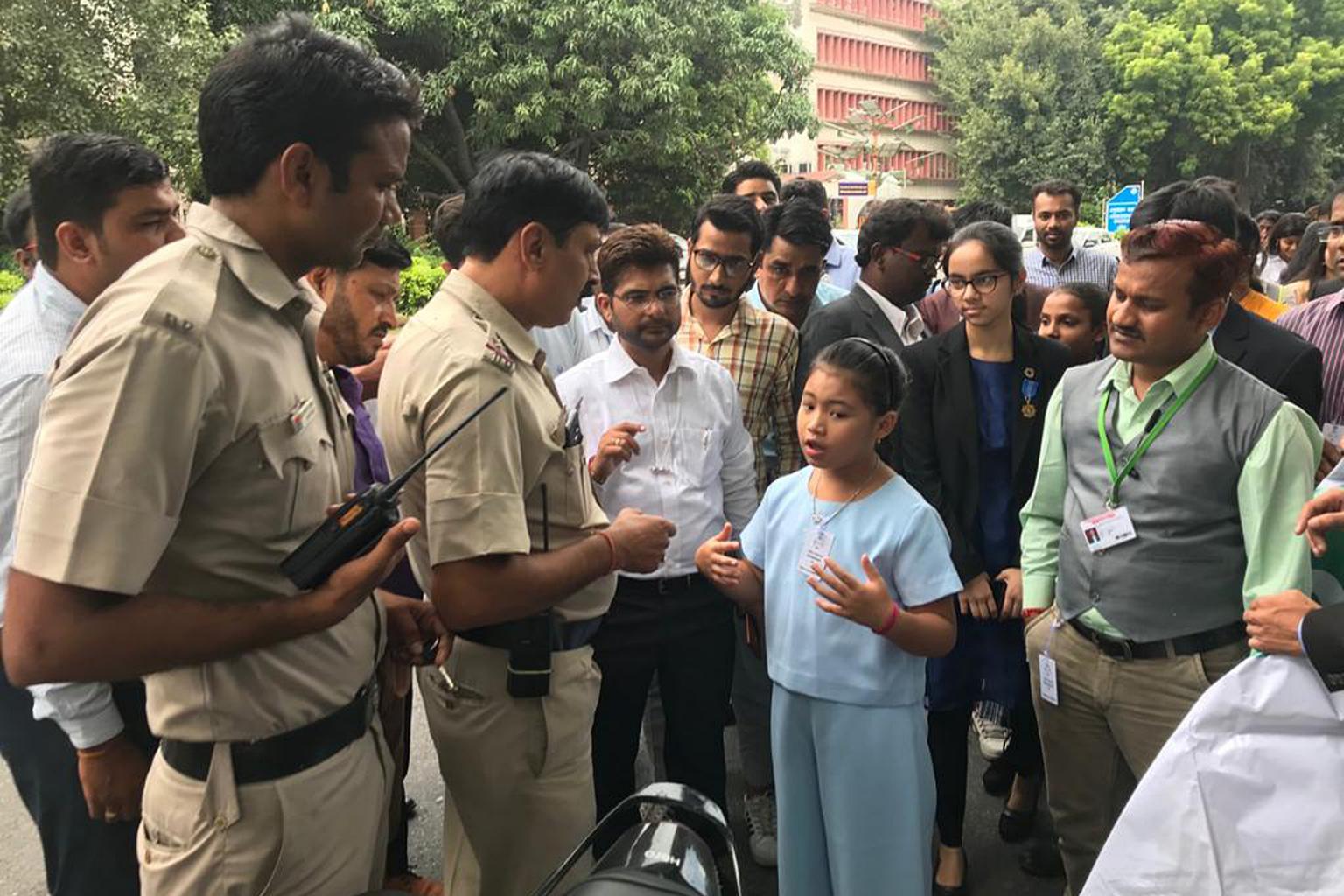One year on, child climate activist, 8, continues strike outside Indian parliament
Sign up now: Get insights on Asia's fast-moving developments

Licypriya Kangujam (in blue) wants India to make policies recognising the climate emergency and make the subject mandatory in Indian schools.
PHOTO: THE CHILD MOVEMENT
Follow topic:
BANGALORE - On Feb 2 last year, a seven-year-old walked up to Parliament House in India's capital, holding a handmade sign with a message for Prime Minister Narendra Modi.
"Dear Mr Modi and MPs, pass the climate change law! Act Now," the poster said.
She has done this once a week for a whole year now, through spring, summer and the most smog-filled winter New Delhi has seen in years.
Licypriya Kangujam is eight today. The young activist wants India to make policies recognising the climate emergency and make the subject mandatory in Indian schools.
People often call Ms Kangujam the "Greta Thunberg of India", comparing her to the Swedish climate activist whose Fridays for Future school strike has grown into a global movement.
The comparison makes Ms Kangujam "very angry", although she is "good friends" with Ms Thunberg.
"It's like erasing my roots and my journey," she told The Straits Times.
Both attended the United Nations climate change conference, also known as COP25, in Madrid, Spain, in December.
There were young activists from Africa, South America and China, but Ms Kangujam noticed that the media only focused on Ms Thunberg.
While Ms Kangujam reacted with an instinctive anger, her father Mr KK Singh, a disaster relief activist, explains that such lopsided attention from Western media only reinforced unjust global hierarchies.
"Such comparisons erase the names of non-white activists from the global south, and silences the voices from developing countries that are already facing the effects of climate change," he said.
India ranks as the fifth-most vulnerable country in terms of extreme weather events. Studies show that the current efforts to slow down global warming will see average temperatures in India rise by 1 to 2 deg C by 2050.
Hailing from Manipur, a hilly, forested north-eastern state in India, Ms Kangujam first learned about the impact of climate change when she accompanied her father to distribute relief materials to victims of the devastating Nepal earthquake in 2015.
She was just over three years old then, and the visit left a lasting impact.
"My heart feels sorrow for people who can't help themselves when disaster strikes. I also visited many landslides areas in my childhood. Many root causes of such natural disasters are the impact of climate change," Ms Kangujam said.
In July 2018, she had the opportunity to attend the Asia Ministerial Conference for Disaster Risks Reduction in Ulaanbaatar, the capital city of Mongolia. There, she gave her first speech.
"It was a life changing event," she said.
As soon as she returned home, Ms Kangujam started The Child Movement to rally children to demand leaders to act fast to cut carbon emissions. She says she has already visited 32 countries on this mission.
Thanks to her efforts in India, over 145,000 government and private-run schools in the western states of Gujarat and Rajasthan have promised to include climate change in their curriculum.
Next, she's focused on getting Japan to host the world's first green Olympics.
"If leaders don't act now, they will leave us a dirty earth without trees, bad water and air we can't breathe. I'll have to become a space scientist to build rockets for us to live on the moon or Mars!" Ms Kangujam said, on a video call from New Delhi on a rare day off to relax and play with her five-year-old sister.
Being a child activist has not been easy. Ms Kangujam quit school last year in Bhubaneshwar, Odisha, because "it was 3,000km from Delhi" where she was striking every week.
"Most of my time in 2019 was spent in my protests, movements and attending various events (across the world). Even my mum didn't support me (initially) as she was concerned about my studies," she said.
Her father, on the other hand, is her "true hero".
The family has now decided to move to New Delhi, where Ms Kangujam will attend school soon.
Her father said she only recently learned about the Intergovernmental Panel on Climate Change's reports assessing the science related to climate change.
"She has a passion for the climate crisis because it is an issue her generation will face," he said. For technical issues, she seeks advice from UN experts and independent scientists.
Barely four feet tall, Ms Kangujam makes dozens of policemen in the high security area around Parliament House nervous. Last week, they tried to pull her away, asking her to get permission. But Ms Kangujam stood her ground.
"People don't take me seriously because I'm a small girl," she said. "But I'm fighting for the future of my generation. The leaders should listen to us."

